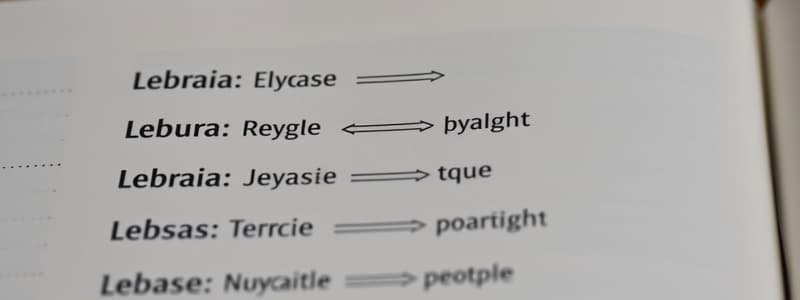Podcast
Questions and Answers
Which of the following is an example of the Present Perfect Continuous tense?
Which of the following is an example of the Present Perfect Continuous tense?
- I am walking.
- I have been walking. (correct)
- I have walked.
- I walked.
Which form correctly represents the Past Perfect tense?
Which form correctly represents the Past Perfect tense?
- I was walking.
- I have walked.
- I walked.
- I had walked. (correct)
What is the correct form of the Future Perfect tense?
What is the correct form of the Future Perfect tense?
- I will walk.
- I have walked.
- I will have walked. (correct)
- I will be walking.
Identify the form of the Past Continuous tense.
Identify the form of the Past Continuous tense.
Which of the following sentences exemplifies the Simple Future tense?
Which of the following sentences exemplifies the Simple Future tense?
Which of the following describes the Perfect Progressive tense?
Which of the following describes the Perfect Progressive tense?
What is the structure of the Present Tense in its Simple form?
What is the structure of the Present Tense in its Simple form?
Identify the sentence that illustrates the Future Continuous tense.
Identify the sentence that illustrates the Future Continuous tense.
Flashcards are hidden until you start studying
Study Notes
Tense
- Definition: Tense indicates the time of action or state of being as expressed by a verb.
Present Tense
- Describes actions happening now or habitual actions.
- Forms:
- Simple Present: "I walk."
- Present Continuous (Progressive): "I am walking."
- Present Perfect: "I have walked."
- Present Perfect Continuous: "I have been walking."
Past Tense
- Describes actions that have already happened.
- Forms:
- Simple Past: "I walked."
- Past Continuous (Progressive): "I was walking."
- Past Perfect: "I had walked."
- Past Perfect Continuous: "I had been walking."
Future Tense
- Describes actions that will happen.
- Forms:
- Simple Future: "I will walk."
- Future Continuous (Progressive): "I will be walking."
- Future Perfect: "I will have walked."
- Future Perfect Continuous: "I will have been walking."
Perfect Tense
- Indicates completed actions with relevance to another time.
- Forms:
- Present Perfect: "I have eaten."
- Past Perfect: "I had eaten."
- Future Perfect: "I will have eaten."
Progressive Tense
- Describes ongoing actions at a specific time.
- Forms:
- Present Progressive: "I am reading."
- Past Progressive: "I was reading."
- Future Progressive: "I will be reading."
- Perfect Progressive: Combines perfect and progressive aspects:
- Present Perfect Progressive: "I have been reading."
- Past Perfect Progressive: "I had been reading."
- Future Perfect Progressive: "I will have been reading."
Summary
- Tenses are vital for indicating time in language structure.
- Each tense has specific forms that help convey the timing and nature of an action.
Tense
- Tense is a grammatical category that expresses the time of an action or state of being as indicated by a verb.
Present Tense
- Represents actions currently occurring or habits.
- Includes:
- Simple Present: Describes general truths or habitual actions, e.g., "I walk."
- Present Continuous: Indicates actions in progress at the moment of speaking, e.g., "I am walking."
- Present Perfect: Relates past actions to the present, e.g., "I have walked."
- Present Perfect Continuous: Describes actions that started in the past and continue to the present, e.g., "I have been walking."
Past Tense
- Indicates actions that have already occurred.
- Includes:
- Simple Past: Refers to completed actions in the past, e.g., "I walked."
- Past Continuous: Shows actions that were ongoing in the past, e.g., "I was walking."
- Past Perfect: Describes actions completed before another past action, e.g., "I had walked."
- Past Perfect Continuous: Indicates ongoing actions that were happening before another past event, e.g., "I had been walking."
Future Tense
- Expresses actions that are expected to happen.
- Includes:
- Simple Future: Indicates actions that will occur, e.g., "I will walk."
- Future Continuous: Refers to actions that will be ongoing at a specific future time, e.g., "I will be walking."
- Future Perfect: Describes actions that will be completed before a certain point in the future, e.g., "I will have walked."
- Future Perfect Continuous: Indicates ongoing actions that will continue until a specified future point, e.g., "I will have been walking."
Perfect Tense
- Highlights completed actions relevant to another time frame.
- Forms include:
- Present Perfect: Connects past experiences to the present, e.g., "I have eaten."
- Past Perfect: Refers to completed actions prior to a past moment, e.g., "I had eaten."
- Future Perfect: Discusses actions that will be completed by a future time, e.g., "I will have eaten."
Progressive Tense
- Describes ongoing actions occurring at a particular moment or time.
- Forms include:
- Present Progressive: Indicates actions in progress now, e.g., "I am reading."
- Past Progressive: Shows actions that were in progress at a specific time in the past, e.g., "I was reading."
- Future Progressive: Refers to actions that will be in progress at a future time, e.g., "I will be reading."
- Perfect Progressive: Combines elements of perfect and progressive aspects, including:
- Present Perfect Progressive: Ongoing actions that began in the past and continue to the present, e.g., "I have been reading."
- Past Perfect Progressive: Actions that were ongoing before another past action, e.g., "I had been reading."
- Future Perfect Progressive: Refers to actions that will be ongoing until a certain point in the future, e.g., "I will have been reading."
Summary
- Understanding tenses is essential for articulating timing and nature of actions in language.
- Each tense has distinct forms that clarify whether actions are past, present, or future and their respective continuity or completion.
Studying That Suits You
Use AI to generate personalized quizzes and flashcards to suit your learning preferences.




